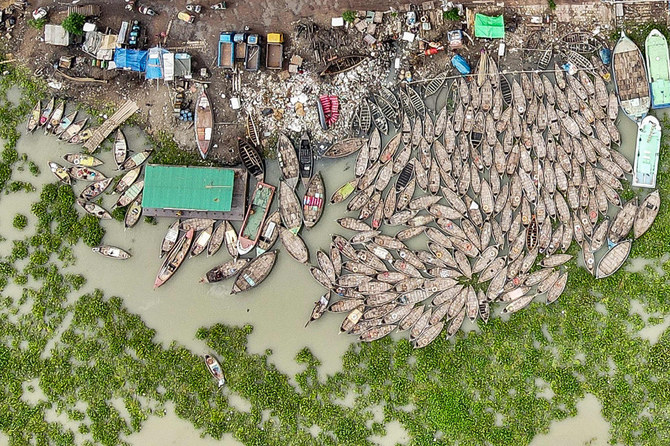DHAKA: Clothing manufacturers in Bangladesh are calling on the government to accelerate vaccination programs for factory workers to save the country’s textile sector. It is suffering because a COVID-19 lockdown has halted production during the peak season for orders from Western countries.
A recent surge in cases of the highly contagious delta variant of the coronavirus forced the government to impose strict health precautions, including a halt to all business activity between July 23 and Aug. 5. As a result, thousands of garment factories had to close — and the timing could not be worse.
This is the time of year when the factories are working on multimillion-dollar orders from major Western clothing brands such as H&M, Inditex and Marks and Spencer for their upcoming winter collections. July and August are the peak months for the Bangladeshi garment sector, during which it exports nearly 40 percent of its annual production.
Industry representatives met Cabinet Secretary Khandaker Anwarul Islam on Thursday to appeal to the government to lift the restrictions on garment factories during this crucial period. They also called on authorities speed up the vaccination of factory workers.
Last week, nearly 30,000 workers from factories that supply H&M and Marks and Spencer received a first dose of the Moderna vaccine. But they represent less than 1 percent of the total industry workforce, and the country’s vaccination effort is one of the slowest in the world; only 4.3 million of the country’s 170 million population have been fully vaccinated.
“Once the factories open, we can vaccinate the workers in bulk,” Faruque Hassan, president of the Bangladesh Garment Manufacturers and Exporters Association told Arab News on Friday. “And it’s very easy, as we noticed during a pilot program that saw the successful inoculation of about 30,000 factory workers in two days.”
Garment manufacturers fear that if they fail to deliver, big brands might turn to factories in other countries. This would deal a major blow to an industry that is the largest in Bangladesh. It employs more than 4 million people, contributes more than 11 percent of the country’s gross domestic product, and accounts for 80 percent of its exports.
“Our industry is completely export-oriented and we produce time-bound products,” said Hassan. “Currently, our factories are working on the next winter and fall season for the Western market. If we fail to export on time our credibility and future business relations will be at stake. Already buyers have stated putting future orders on hold, but they didn’t cancel them.
“If we are allowed to open the factories from the first week of August, we still can recover the losses — otherwise things will be difficult for us.”
The lockdown in Bangladesh comes as many Western countries ease their pandemic restrictions. Apparel sales are rebounding as life begins to return to normal, people order more clothes and big brands prepare for their winter and Christmas seasons.
When Bangladesh went into its first coronavirus lockdown last year, the industry was not too concerned because Western buyers had put their orders on hold because of their own lockdowns. Now, things are different.
“This year, the Western market is fully open,” Hassan said. “People in Europe and America are now keen to buy clothing since they couldn’t do much in the past year.”
Before the pandemic, Bangladesh, the world’s second-largest garment manufacturer after China, earned $34 billion from exports of apparel. In the 2019-20 fiscal year the value of exports dropped to $28 billion as the pandemic took hold. They recovered to $31 billion during the 2020-21 fiscal year, which ended in June, raising hopes of a major rebound this year.
It was unclear on Friday whether the factories will be allowed to reopen sooner than planned. The cabinet secretary told the factory owners during Thursday’s meeting that “further decisions would be announced after consulting with the prime minister.”
Criticism of the lockdown is growing, as the strict rules do not appear to be succeeding in slowing the spread of COVID-19. The number of coronavirus-related fatalities continues to hit record highs, with more than 200 deaths since the start of this week alone. The infection rate stood at nearly 31 percent on Friday, higher that it was before the lockdown.
“Our economy has been severely disrupted due to the lockdown,” Zahid Hussain, a former lead economist at the World Bank in Dhaka, told Arab News. “If we are failing to reap the benefits of this lockdown, there is no point in closing the factory operations.”


























